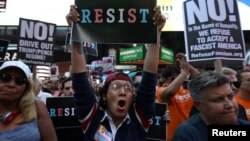A federal appeals court in Virginia on Thursday rejected a bid by President Donald Trump's administration to prevent the U.S. military from accepting transgender recruits starting January 1.
The administration had urged the appeals court to suspend an order by a federal judge in Baltimore for the armed forces to begin accepting transgender recruits on that date. The administration has said the January 1 start date was causing the armed forces to scramble to revise their policies at the risk of harming military readiness.
In a brief two-paragraph order, the three-judge panel of the Richmond-based 4th U.S. Circuit Court of Appeals said it was denying the administration's request while the appeal proceeds.
Several transgender service members filed suit in Maryland after Trump said in July he would ban transgender people from the military, a move that would reverse a policy of the Republican president's Democratic predecessor Barack Obama to accept them. Trump cited concern over military focus and medical costs.
So far, three federal judges around the country have issued injunctions blocking Trump's ban. His administration has appealed all three rulings.
Thursday's action was in response to the administration's appeal of a November 21 ruling by U.S. District Judge Marvin Garbis, who said the transgender prohibition likely violates the plaintiffs' constitutional right to equal protection under the law.
The Garbis ruling followed a similar one on October 30 by another federal judge in Washington, D.C. A third judge in Seattle also ruled against the administration on December 11.
In an August memorandum, Trump gave the military until March 2018 to revert to a policy prohibiting openly transgender people from joining the military and authorizing their discharge. The memo also halted the use of government funds for sex-reassignment surgery for active-duty military personnel.
The Obama administration had set a deadline of July 1 of this year to begin accepting transgender recruits. But Trump's defense secretary, James Mattis, postponed that date to January 1, which the president's ban then put off indefinitely.
Reporting by Andrew Chung; Editing by Will Dunham.





